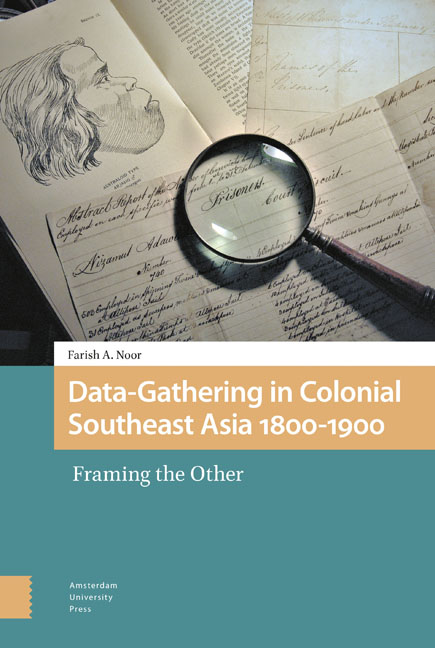Book contents
- Frontmatter
- Dedication
- Contents
- A Note on Spelling
- Introduction: The Panopticon in the Indies: Data-Gathering and the Power of Knowing
- 1 Caught in the Eye of Empire: Stamford Raffles’ 1814 Java Regulations
- 2 Deadly Testimonies: John Crawfurd’s Embassy to the Court of Ava and the Framing of the Burman
- 3 Fairy Tales and Nightmares: Identifying the ‘Good’ Asians and the ‘Bad’ Asians in the Writings of Low St. John
- 4 The Needle of Empire: The Mapping of the Malay in the works of Daly and Clifford
- 5 The Panopticon in the Indies: Data-collecting and the Building of the Colonial State in Southeast Asia
- Appendix A Proclamation of Lord Minto, Governor-General of British India, at Molenvliet, Java, 11 September 1811
- Appendix B Proclamation of Stamford Raffles, Lieutenant-General of Java, At Batavia, Java, 15 October 1813
- Appendix C The Treaty of Peace Concluded at Yandabo
- Appendix D The Treaty of Friendship and Commerce between Her Majesty and the Sultan of Borneo (Brunei). Signed, in the English and Malay Languages, 27 May 1847
- Appendix E The Racial Census employed in British Malaya from 1871 to 1931
- Timeline of Events and Developments in Southeast Asia 1800-1900
- Bibliography
- Index
3 - Fairy Tales and Nightmares: Identifying the ‘Good’ Asians and the ‘Bad’ Asians in the Writings of Low St. John
Published online by Cambridge University Press: 21 November 2020
- Frontmatter
- Dedication
- Contents
- A Note on Spelling
- Introduction: The Panopticon in the Indies: Data-Gathering and the Power of Knowing
- 1 Caught in the Eye of Empire: Stamford Raffles’ 1814 Java Regulations
- 2 Deadly Testimonies: John Crawfurd’s Embassy to the Court of Ava and the Framing of the Burman
- 3 Fairy Tales and Nightmares: Identifying the ‘Good’ Asians and the ‘Bad’ Asians in the Writings of Low St. John
- 4 The Needle of Empire: The Mapping of the Malay in the works of Daly and Clifford
- 5 The Panopticon in the Indies: Data-collecting and the Building of the Colonial State in Southeast Asia
- Appendix A Proclamation of Lord Minto, Governor-General of British India, at Molenvliet, Java, 11 September 1811
- Appendix B Proclamation of Stamford Raffles, Lieutenant-General of Java, At Batavia, Java, 15 October 1813
- Appendix C The Treaty of Peace Concluded at Yandabo
- Appendix D The Treaty of Friendship and Commerce between Her Majesty and the Sultan of Borneo (Brunei). Signed, in the English and Malay Languages, 27 May 1847
- Appendix E The Racial Census employed in British Malaya from 1871 to 1931
- Timeline of Events and Developments in Southeast Asia 1800-1900
- Bibliography
- Index
Summary
Every fairy tale had a bloody lining.
Alice Hoffman,The Ice Queen (2006)All conquest literature seeks to explain to the conquerors ‘why we are here’.
Robert Bartlett,The Making of Europe (1993)Fairy Tale Beginnings: Hugh Low Spins the Tale of Sarawak's ‘Redemption’
Little or nothing decisive could be achieved without the co-operation of our Englishman.
Hugh Low,Sarawak; Its Inhabitants and Productions (1848)Empires are seldom born out of wedlock, for they are the result of the union of power and knowledge. But the sanguinary aspect of empire-building was often tidied up later by the imperial knowledge-producers whose task it was to account for that birth and how that empire came to be. After the blood-letting and bursting of shells and rockets would come the modalities of data-collecting and analysis. And the study of the defeated natives – their bodies, their land, and all the living things that flew, swam and crept around them – would furnish the gloss of scientific enquiry that made empire-building palatable to those who would otherwise have recoiled at the sight of native settlements razed to the ground by gunboats in action.
One such data-collector and knowledge-producer was the son of the Scottish horticulturist Hugh Low (1824-1905). Low's father – Hugh Low Senior – had sent his son to Southeast Asia to collect some rare plants that might be cultivated back in Britain. Green as grass and keen as mustard Low did as he was told and set off for Southeast Asia. But Low the Younger tarried longer than he should have, and ended up staying in Southeast Asia until 1889. By the time he retired from service he had been witness to the birth of the Straits Settlements, the Federated Malay States and the Kingdom of the so-called ‘White Rajah’ of Sarawak, and had served both in Borneo and British Malaya. The amateur naturalist from Upper Clapton would evolve to become the first ‘model’ British colonial Resident in Malaya, but our interest in him lies in his writing in particular. For not only would Low develop the model for colonial economic management and race relations in the decades to come, he would also show – in his writing – how the colonial power viewed and framed the native Others who were now caught in the gaze of Empire.
- Type
- Chapter
- Information
- Data-Gathering in Colonial Southeast Asia 1800–1900Framing the Other, pp. 115 - 152Publisher: Amsterdam University PressPrint publication year: 2019



